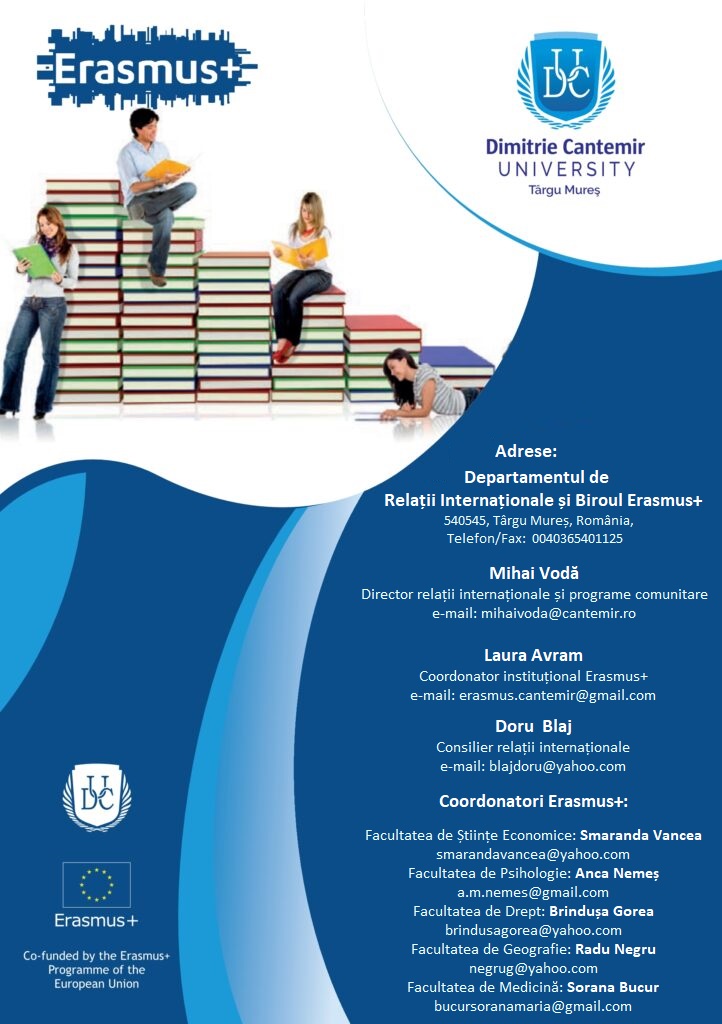International openness and modernization is a major priority through which “Dimitrie Cantemir” University (UDC) intends to increase its visibility and attractiveness internationally. Therefore, the mission and objectives set, which are of the greatest importance are:
– to strive for the development of the quality and internationalization of education, recognizing the essential contribution of the mobility of students and staff and of participation in international cooperation projects, the quality of its higher education programs and the experience of students.
– to increase the level of internationalization of study programs and the development of innovative content, services and offers for lifelong learning based on JTIs.
– to strengthen its relations with traditional partners and to create new partnerships, extending the existing international network in the fields of faculties in our university, in higher education institutions in Europe (Hungary, Germany, Spain, Turkey, France, Latvia, Iceland, Ireland, Malta, Bosnia, Kosovo) and outside Europe (Kenya, Uganda, India, China, Malaysia, Cambodia, Indonesia, USA, New Zealand).
The UDC’s strategy is to select its partners and conclude cooperation agreements, primarily with institutions that will grant ECTS credits to each other, both to students abroad and to those who leave. In addition, both sides of the agreement need to comply with the Bologna Agreement standard regarding the length of study periods and quality control.
Participation in the Erasmus International Weeks was a good opportunity to find reliable Erasmus partner and this will continue to be exploited in the future. Dimitrie Cantemir University applies several criteria when evaluating higher education programs in other European countries. Some of these are: the duration of the study program, the level of difficulty, the diploma project, or the dissertation, as well as the final purpose of the study program regarding future studies or employment.
Cooperation within the Erasmus network and the LLP program takes place mainly in the UDC, in order to extend the mediation of international reciprocal mobility of students and staff, with similar institutions in the participating countries. Consequently, DCU encourages improving the quality and increasing the volume of mobility of Erasmus students, teachers, and staff in all forms of education and training.
Development of student mobility in the two cycles: bachelor’s and master’s level, including students from underrepresented groups. UDC has always strived to achieve non-discrimination goals and has no limits on student enrollment, regardless of gender or nationality, seeking to integrate students and staff with disabilities.
The promotion, encouragement, and extension of didactic mobility (STA) for the improvement of education, academic development and scientific research are part of the UDC’s internationalization strategy.
STA will enhance language skills, provide academic information, and broaden the professional perspective. Planned teaching changes in the LLP will normally include shorter periods of time to allow more teachers to benefit from them, but may also include a longer stay for study, teaching, or research. Staff mobility has been/will be encouraged and recognized by the management of the institution.
UDC will continue to ensure the transparent and equitable allocation of the scholarship amount, for student mobility, placement, or teaching, in accordance with the legislation. There will be transparent information about faculty members, Erasmus scholarships, application procedures, criteria, and timetable. Erasmus activities will be visible in introductory courses, in the student guide, in staff meetings, on information boards and on the institution’s website.
UDC also organizes other support actions and promotion activities for the international Erasmus collaboration for both the mobility of teachers and academic staff, as well as students.
UDC recognizes the importance and gives visibility to the results obtained by the members of the academic staff, involved in individual mobilities or in cooperation projects with strategic partners.
UDC will continue to strengthen the international promotion of the university in order to encourage the mobility of “arrived” students and teachers, aiming to increase the attractiveness of the university.
UDC will expand its offer for the range of tutorials, materials, and exams in English.
UDC processes information and reports to NA and other international monitoring bodies, information on Erasmus actions; In addition, the University will consider the results of internal monitoring of European and international mobility and cooperation activities to date, thus further developing international performance.
UDC will apply for projects, strive to cooperate in projects and other Erasmus actions focused on cooperation between higher education and enterprises. Therefore, we will try to expand our Erasmus activity by implementing multilateral projects and networks, as well as Erasmus accompanying measures, which contribute to the modernization agenda of our university.
The UDC actively participates in European and international cooperation projects, setting from the outset the objectives for its participation, the role it intends to play and the results it expects to achieve. Participation in such projects is integrated into the strategy of modernization and internationalization of UDC, and will lead to the development of international involvement.
Before concluding new partnerships, the UDC considers the priorities of the geographical area and the field, as well as the institutional capacity to actively participate and implement the results of the project in relation to the projects implemented under the program.
UDC is committed to fully supporting any student and teacher who participates in them, both from the position of coordinator and partner. Participation in international projects is seen as an important aspect of the professional development of academic staff and the modernization of the university.
UDC will implement any results resulting from participation in cooperation projects and will ensure the visibility of project activities and results, through partnerships with other higher education institutions and organizations, the use of the Internet, presentations at meetings, posters and other dissemination activities.
The growth of the UDC will be a catalyst for change, to increase the quality of education and to look for new ways to provide education.
The UDC must attract a wider component of society to higher education, including disadvantaged and vulnerable groups and use all available resources to meet this challenge.
The participation of “Dimitrie Cantemir” University in this program will encourage the mobilization of students from underrepresented groups and “non-traditional” students, including adults.
The UDC will provide more transparent information about educational opportunities and outcomes, as well as personalized guidance, to support study choices and reduce early school abandonment.
UDC’s participation in this program will contribute to the involvement of employers and labor market institutions in the design and delivery of programs.
UDC supports staff exchanges and includes practical experience in courses.
To improve the quality and relevance of expanding student numbers and to increase student involvement in various groups, UDC will develop new, flexible, and innovative learning approaches, dissemination methods and increase the use of virtual learning platforms.
UDC will look for alumni careers to improve program design and increase its relevance.
The UDC will turn study mobility into an educational program, seek to remove unnecessary barriers to cross-border cooperation and exchange, ensure the recognition of credits earned abroad through the consistent use of ECTS and the Diploma Supplement and improve employment conditions and opportunities for progress for students, researchers, and teachers in other countries.
UDC is involved in the development of local and regional development plans, hoping that participation in the program will contribute to better regional support for cooperation between higher education and business.
The UDC will make mobility and cooperation central to its institutional policy, develop cooperation with partners in other EU and non-EU countries, promote and support the mobility of students and staff, including those in under-represented groups.
UDC will encourage better identification of the real costs of higher education and research and will reward performance to attract the best teaching and research staff. Participation in the program will also help the UDC to establish new admission policies and introduce new academic programs.





 Director of International Relations Department
Director of International Relations Department




